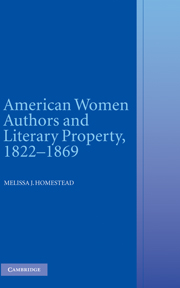Book contents
- Frontmatter
- Contents
- Preface: “Imperfect Title”
- Acknowledgments
- Introduction: “Lady-Writers” and “Copyright, Authors, and Authorship” in Nineteenth-Century America
- 1 Authors, Wives, Slaves: Coverture, Copyright, and Authorial Dispossession, 1831–1869
- 2 “Suited to the Market”: Catharine Sedgwick, Female Authorship, and the Literary Property Debates, 1822–1842
- 3 “When I Can Read My Title Clear”: Harriet Beecher Stowe and the Stowe v. Thomas Copyright Infringement Case (1853)
- 4 “Every body sees the theft”: Fanny Fern and Periodical Reprinting in the 1850s
- 5 A “Rank Rebel” Lady and Her Literary Property: Augusta Jane Evans and Copyright, the Civil War and After, 1861–1868
- Epilogue: Belford v. Scribner (1892) and the Ghost of Mary Virginia Terhune's Phemie's Temptation (1869); or, The Lessons of the “Lady-Writers” of the 1820s through the 1860s for Literary History and Twenty-First-Century Copyright Law
- Index
Epilogue: Belford v. Scribner (1892) and the Ghost of Mary Virginia Terhune's Phemie's Temptation (1869); or, The Lessons of the “Lady-Writers” of the 1820s through the 1860s for Literary History and Twenty-First-Century Copyright Law
Published online by Cambridge University Press: 24 July 2009
- Frontmatter
- Contents
- Preface: “Imperfect Title”
- Acknowledgments
- Introduction: “Lady-Writers” and “Copyright, Authors, and Authorship” in Nineteenth-Century America
- 1 Authors, Wives, Slaves: Coverture, Copyright, and Authorial Dispossession, 1831–1869
- 2 “Suited to the Market”: Catharine Sedgwick, Female Authorship, and the Literary Property Debates, 1822–1842
- 3 “When I Can Read My Title Clear”: Harriet Beecher Stowe and the Stowe v. Thomas Copyright Infringement Case (1853)
- 4 “Every body sees the theft”: Fanny Fern and Periodical Reprinting in the 1850s
- 5 A “Rank Rebel” Lady and Her Literary Property: Augusta Jane Evans and Copyright, the Civil War and After, 1861–1868
- Epilogue: Belford v. Scribner (1892) and the Ghost of Mary Virginia Terhune's Phemie's Temptation (1869); or, The Lessons of the “Lady-Writers” of the 1820s through the 1860s for Literary History and Twenty-First-Century Copyright Law
- Index
Summary
In Chapter 1, I stated that no court ever issued an opinion explicitly ruling on the implications of the intersection between coverture and copyright for a married woman's literary proprietorship – which is not to say that no party to a litigation ever asked a court to rule on the issue. In an ironic twist of fate, the intersection between coverture and copyright became a key issue in a copyright infringement suit involving a work by Mary Virginia Terhune, the author of Phemie's Temptation, the novel that figures prominently in my analysis of coverture and copyright in Chapter 1. The Supreme Court issued the decision that finally resolved the case in 1892, thirty-four years after Godey's Lady's Book began serializing Phemie's Temptation. Although I will not attempt to delve as deeply into the legal and social climate of the 1880s, 1890s, and beyond as I have into that of the 1820s through the 1860s, this dispute suggests the continuing importance of the intersection between coverture and copyright – as an ongoing reality for women authors in the late nineteenth century, as a force in twentieth-century constructions of literary history of the nineteenth century, and as a cautionary tale for the continuing expansion of copyright in the twenty-first century.
When Mary Virginia Terhune began writing Phemie's Temptation in 1867, she had been a popular novelist for thirteen years and a married woman for eleven (her first novel, Alone, published in 1854 in Richmond, was so successful that J. C. Derby republished it the following year in New York; she married Edward Payson Terhune in 1856).
- Type
- Chapter
- Information
- American Women Authors and Literary Property, 1822–1869 , pp. 239 - 264Publisher: Cambridge University PressPrint publication year: 2005



